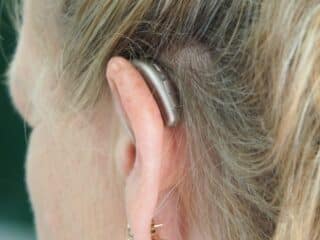
Misconceptions About Cannabis and Hearing
Many marijuana users claim to experience heightened responses when listening to music after smoking cannabis. They assume that the THC and other compounds found in marijuana must impact auditory perception directly by enhancing their hearing. So far, modern science has provided no evidence that this is actually the case. Rather, those who smoke marijuana experience increased dopamine levels, which heightens responses to audio stimuli. In other words, most researchers now believe it’s not a change in hearing that makes the music sound so good to people who have smoked marijuana, but an increase in dopamine.
Cannabis Can Dampen the Effects of Music
According to a research study performed in Britain and published in the International Journal of Neuropsychopharmacology, at least one compound found in marijuana may actually dampen the effects of music. The researchers used brain imaging to determine how smoking marijuana affected activity in the auditory cortex and other areas of the brain associated with processing sound. They found that smoking joints that contained THC, but no CBD caused reduced reactions in these areas of the brain. These results thoroughly refute the anecdotal evidence that musicians and music enthusiasts enjoy music more after consuming marijuana.
What is interesting is that the study showed that participants who smoked joints of marijuana that contained more CBD did not experience reduced reactions in the audio cortex or other areas of their brains responsible for processing sound. It is this observation that led the researchers to infer that the compound responsible for reduced auditory cortex activity is a result of consuming THC, not CBD. Those who want to experiment with using cannabis as part of their wellness routines without risking unintentionally dampening their auditory perception can find pure CBD at purerelief.com.
Conflicting Opinions
While most researchers do not believe that cannabis consumption has any impact on hearing or auditory perception at all, there is not a complete consensus, especially when it comes to music appreciation. Researcher Jorg Fachner found that when he took an ethnomethodological approach to study cannabis use and music perception in a naturalistic setting, listeners did experience some changes in how their brains perceived sounds.
By using a bedside EEG machine set up in participants’ homes, Fachner found that cannabis use produced an increased Alpha-signal strength in the parietal association cortex. He also noted Theta band changes in temporal and occipital areas related to sound processing. These findings, he believes, indicate that listeners experience an altered perception of music caused by hyper-focusing on acoustics as a result of marijuana’s psychoactive activity in the brain. It is unclear which components in marijuana were responsible for producing the effects seen in Fachner’s experiment.
The Good News for Cannabis Users
While the jury is still out as to whether cannabis has any benefits when it comes to hearing and auditory perception, the good news is that researchers don’t think it causes any harm, either. This assumption is borne out by one of the first tests ever performed on marijuana users all the way back in 1976. The study explored the correlation between cannabis and hearing, with researchers testing participants both before and after they had smoked marijuana.
While some participants reported a feeling of enhanced appreciation of music and sound after smoking, none experienced either heightened or dampened hearing. The implications of this early study are that while cannabis does not improve consumers’ auditory perception, it doesn’t negatively affect it, either. Using cannabis that contains THC has the same effect on hearing as taking a placebo: it produces no statistically significant results.
The Good News for Those with Tinnitus
More recent research has shown that while cannabis use does not enhance hearing, it can be an effective treatment for tinnitus, a constant ringing in the ears related to certain underlying conditions like age-related hearing loss, ear injuries, and circulatory system disorders. Tinnitus can disrupt sleep patterns, cause trouble concentrating, and are associated with depression, anxiety, irritability, stress, fatigue, and memory problems.
In 2009, Dr. Thanos Tzounopoulos performed an experiment on mice that found the effects of cannabis on the endocannabinoid system provided relief from tinnitus. This early research led to its use as a treatment to manage the condition and its complications. Medical cannabis doesn’t just reduce ringing in the ears but also makes it easier to fall asleep, alleviating secondary symptoms like fatigue, depression, irritability, and memory problems.
Avenues for Further Research
While it is clear by now that cannabis does not affect hearing, the fact that some researchers have uncovered altered brain activity in regions associated with processing sound means that there’s still plenty to explore when it comes to cannabis and auditory perception. Scientists face many hurdles when it comes to experimenting with marijuana, which is still considered a controlled substance in most places, but it would be interesting to see more research into how other cannabinoids, such as CBD, affect auditory perception, music appreciation, sense of timing, and other related faculties.
The Bottom Line
Those who want to use cannabis, either in the form of hemp-derived CBD or full-spectrum marijuana, need not worry about its impact on their hearing. While cannabis use doesn’t show the potential for creating statistically significant improvements in hearing, it doesn’t cause any harm, either. For those with tinnitus, cannabis use can be of great help in reducing symptoms and managing complications. Chances are, as researchers continue to study the link between cannabis and auditory disorders, they will continue to uncover other ways that this beneficial plant and its compounds could be used to treat diverse other issues, as well, but only time will tell.







4 comments
I would never have thought that I would grow cannabis at home, but now it really fascinates me, so I decided not to miss this state when I really want to do something. Well, despite the fact that marijuana is a rather unpretentious plant, here you can find various tips and recommendations for growing.
Are you probably using good cannabis or growing it yourself? I personally made the decision a long time ago to grow marijuana myself rather than buy it. Being able to grow autoflowers gives me a bigger yield. You can learn more about it on this page if you’re interested. At any rate, it was very important to me.
Imho cannabis does not affect me negatively and that is good.
This stuff is quite popular now because it helps to relieve extra stress. In addition, it normalizes the process of sleep and many processes. In addition, as soon as I started using hybrid cannabis from this source https://www.westcoastsupply.net/product/mcflurry/ it helped me get rid of constant fatigue, insomnia and weakness of concentration. You can also try it if you want to relieve additional stress.